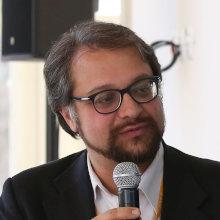Coping with Radical Technological Change: Modes of Knowledge Recombination and Inventive Impact in the Photography Industry

As part of the DEMS Management Webinar series Professor Francesco Rullani (Ca' Foscari University of Venice- Bliss Digital Impact) will present the paper:
“Coping with Radical Technological Change: Modes of Knowledge Recombination and Inventive Impact in the Photography Industry”
Wednesday, May 12, 12:00
Online through Webex (pw: DEMSseminar)
ABSTRACT
Radical technological changes often render obsolete most of the knowledge held by firms. What kind of knowledge then, allows firms to adapt in the presence of radical technological change? Research suggests that firms can adapt by deploying in-house knowledge within the domain that the technological change is based on. However, it is also conceivable that knowledge developed in other domains and/or acquired from external sources may assist adaptation in the face of such change. Research does not address this issue and is, therefore, silent about what is the best mode of knowledge recombination to adapt to radical technological change. To help resolve this issue, we apply an inductive empirical strategy and analyze patents granted within photography, in the context of the industry’s 30-year paradigm shift from chemical to digital technology (1974-2004). Our results show that leveraging prior own experience within the emerging knowledge domain has positive, but smaller, effects on firms’ inventive impact (measured as forward citations), than leveraging knowledge from related, and even unrelated domains (albeit to less extent). Moreover, when the leveraged knowledge is external, this improves performance for all types of knowledge domains.
BIO
Francesco Rullani is Full Professor at Ca' Foscari University of Venice and Director of Bliss – Digital Impact Lab. Before, he worked at LUISS, Copenhagen Business School and ENI Foundation, and he has been visiting fellow at Stanford University and Bocconi. He received his Ph.D. from Sant'Anna School of Advanced Studies. His research focuses on self-organized digital innovation, social innovation and social entrepreneurship. Francesco has explored these themes employing mainly big data analytics, but also theoretical elaboration, qualitative case studies and formal modeling. His publications appeared in Strategic Management Journal, Research Policy, Business Ethics Quarterly, Journal of Business Ethics, Industrial and Corporate Change, and others. He has led and/or participated in projects financed by the European Union (e.g., H2020), National and Regional Authorities (e.g., PRIN; POR FSE), companies and their associations (e.g., RetImpresa) and NGO's (e.g., ActionAid).